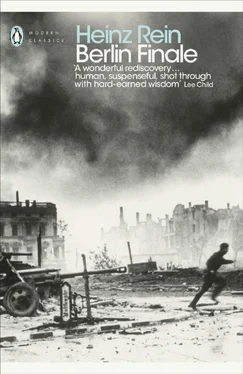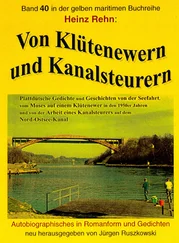Wiegand has not quite overcome the suspicion that is still alert within him, he smiles and nods slightly.
‘Franz Adamek,’ he says.
‘I get it now,’ Lassehn says, and smiles along with the other men. ‘You live in legal illegality. But why do you live illegally, why do you live underground?’
‘You will learn that too, Mr Lassehn,’ Wiegand says with some reluctance. ‘I used to be a trade union secretary, and played an outstanding part in a number of strikes, I believe I may say. When our beloved Party comrade, Prime Minister and master forester Hermann Göring set fire to the Reichstag on the twenty-eighth of Feburary 1933, I was arrested for the first time. And that happened again on different occasions: all political functionaries were taken into custody, as they so sweetly put it, that means they were put in a concentration camp. Then, when the greatest Führer of all time began riding eastward on the twenty-first of June, a similar action was due, but this time they didn’t arrest me, because I had got wind of it and went underground, I became an illegal. Is that enough for you?’
Lassehn shakes his head. ‘Not quite, Mr Wiegand,’ he says. ‘I have another question that doesn’t strike me as unimportant. Why did you not go on living underground? Did you not put yourself in great danger when you went on living under a false name and probably at a different address?’
‘You are completely right,’ Wiegand replies, ‘the danger of being recognized is ever present, and I also know that I’m on the Gestapo wanted list. But that does not deter me from carrying on with my illegal activity.’
Lassehn thinks for a moment. ‘Illegal activity,’ he says then, ‘with the emphasis on activity, I see.’
‘You’ve got it,’ says Wiegand, and the smile on his lips is mirrored in his eyes for the first time. ‘I said that you can live illegally for various reasons. I do it for political reasons, because even if I wasn’t about to be put in a concentration camp, I could hardly have moved, as I was under constant surveillance, it wouldn’t have been possible for me to meet my political friends, I couldn’t have continued to…’ He pauses and bites his lips. ‘In short, every step I took was keenly observed.’
‘And you continue to live undisturbed under your false name?’ asks Lassehn.
‘Insofar as one can live undisturbed these days,’ Wiegand replies. ‘I move lodgings from time to time, so that no one gets a glimpse of the way I live, no one has a chance to become familiar with my habits, and so that I don’t become known in any particular area, which would only restrict my freedom of movement. The worst mistake of those who live illegally is that of lulling themselves into a sense of security, thinking that you’re unobserved, or that you’re not attracting attention. Experience has taught me that everyone observes everyone, that everybody suspects his neighbour, whether it’s because he fears he’s being spied upon or because he himself is a spy, quite apart from those creatures who, without actually being spies, like to make themselves tools of the Party, to demonstrate their loyalty and reliability. Today everyone wears a mask that he only takes off when he is alone, even in the smallest circle of the family people weigh their words very carefully if children are around. A great deal of misfortune has been created by children innocently repeating the thoughtless words of their parents. I know one case in which a whole group was arrested because an allusion by one of our comrades was passed on by his six-year-old son.’
‘I suggest we bring this training course in the theory and practice of the illegal life to an end,’ Dr Böttcher says, and looks at his watch. ‘It’s nearly midnight.’
‘Then it’s time for me to go,’ Wiegand says and gets to his feet. ‘I have to be up at six tomorrow.’
Dr Böttcher rises from his chair as well. ‘And I have a full day’s work ahead of me tomorrow. Will you let us out by the front door, Klose?’
Klose nods. ‘That would be better, then you’ll be on the street in a moment, and won’t need to pass through the courtyard.’
Lassehn is still sitting irresolutely in his chair.
‘What about you?’ Wiegand asks.
‘The boy will stay here tonight,’ Klose replies. ‘And do you have anything particular planned for tomorrow?’ he asks, turning towards Lassehn.
‘I wanted to go to Charlottenburg tomorrow,’ Lassehn replies hesitantly.
‘That’s right,’ Klose says. ‘You wanted to sound out your young wife. Well, you’re right, maybe that’ll be a nicer place for you to stay, with a bit of love and everything.’
Wiegand shakes hands with Lassehn. ‘Goodbye, Mr Lassehn,’ he says simply, ‘will we meet again here at Klose’s house?’
Lassehn shakes his hand firmly, he likes the question, it sounds like proof of trust. ‘Yes, of course,’ he replies eagerly.
Dr Böttcher holds his hand out to him as well. ‘Goodbye, young man, stick with Klose and he’ll see you right.’
Klose closes the door of the restaurant, he turns the key very slowly and, without a sound, carefully opens the door and looks out into the quiet, dark, nocturnal street. ‘The air is pure,’ he says, turning round. ‘Goodbye.’
Dr Böttcher and Wiegand dart outside on tiptoe. In a few seconds they have disappeared into the darkness.
15 April, 9.00 a.m.
On Kurfürstenstrasse there is a house that is clearly different from the other houses nearby. It is not a four-storey block of flats, but an imposing building, it does not have an ordinary front door, but a portal with mirrored doors framed by a pair of Ionic columns, it houses not flats but great halls. The building was once the seat and meeting point for many different masonic lodges. People came here to spend a few hours of unforced, relaxed conviviality. The slightly dusty, slightly ridiculous but, as might be imagined, extremely secretive rites of the fraternal lodges were celebrated here with dignified seriousness, and charity work was also practised on the quiet. But once these official ceremonies had been wound up, and the usual gregariousness began, with coffee parties followed by dancing or cabaret evenings with dilettante contributions by the members, or solid rounds of cards with quarter-pfennigs at stake, then anyone who had arrived here innocently and with no preconceptions would never have found himself thinking that the people here in front of him were members of the dangerous and nation-destroying masonic lodges. Instead he would have had the impression that a nice middle-class choral society or skittles club was enjoying a sociable evening together. He would have seen dignified old and elderly ladies sitting at tables, and heard modest gossip being talked, seen beautiful young women and pretty girls gliding across the parquet with nicely turned-out men and well-behaved boys, and last of all, in the side rooms, he would have seen the older generation of men sitting playing poker or skat, and here too, as elsewhere, delicate threads were being spun, matches made and deals struck. The people coming and going were absolutely harmless, their only spleen directed at the fact that they called themselves not a club or an association but a lodge or a fraternity.
When the incredible happened, and someone from the Viennese underworld was appointed Chancellor of the German Reich by the senile Field Marshal of the First World War, some things changed in this house on Kurfürstenstrasse. No more did delicate ladies’ pumps or dignified patent-leather shoes slip across the parquet, they were replaced by the tread of solid knee-boots and crude military footwear, now sharp, clipped, peremptory, nasal voices rang out through the rooms, and where once consultations were held on the support of members in need, referred to as brothers and sisters, now a giant spider began to weave its ever-growing, deadly net. The portly chairmen of the association, known as incumbents of the chair, had disappeared, and now tall, slender men with hard, angular faces and cold eyes sat in the rooms, they wore grey uniforms, stars or bars and the two SS runes were affixed to their black collars and on the forearm of their jacket sleeve a black diamond.
Читать дальше












